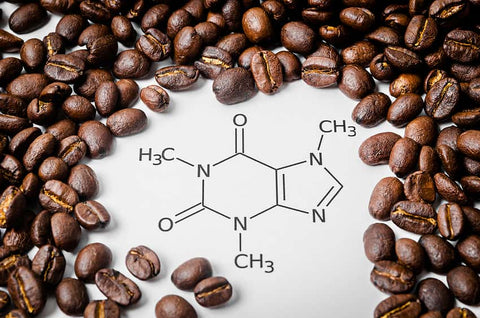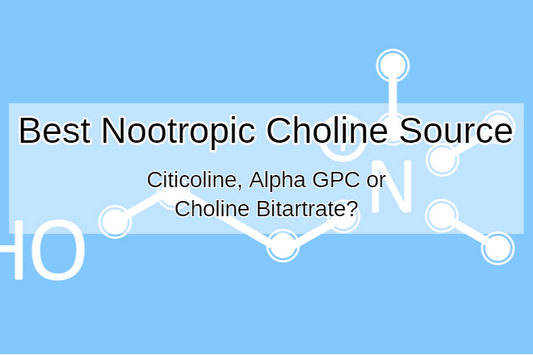Caffeine is one of the most popular drugs. That’s right, caffeine is technically a psychoactive drug, which means that it alters mood, thinking, and behavior.
The average consumption is thought to be around 70mg per person per day, which is no surprise considering billions of people around the globe drink coffee every day.
A large percentage of these people are guzzling their first cup of Joe first thing in the morning in the hopes of increasing alertness, energy, and concentration ready for the day ahead.
Though caffeine does not come just from coffee, you can also find a moderate to high caffeine content in tea, soda, and energy drinks, and even a little in chocolate.
From the way caffeine is commonly used (to increase focus and alertness) you would assume that it works as a cognitive enhancer, or a nootropic.
However, the answer is a lot more complex than this. The use of caffeine as a cognitive enhancer is like a double-edged sword for some, which would explain the rise in nootropics as an alternative to caffeine.
For something to be considered a nootropic, the substance in question must provide a resistance to the effects of certain factors, such as stress, fatigue, and ageing.
Most nootropics confer some kind of boost to energy and alertness, much like caffeine can provide. So, does this mean caffeine can be considered a nootropic? If not, how do they differ?
This article will examine the similarities and differences between caffeine and nootropics, while discussing how, in some cases, the combination of certain nootropics with caffeine can provide more benefits than we may think.
What are Nootropics?
Firstly, let’s discuss the definition of a nootropic.
The term “nootropics” refers to substances that may have a positive impact on mental skills and cognition. Often referred to as “smart drugs” for this very reason.
Nootropics have been on the rise in recent years, being very popular among students looking to ace exams, busy professionals striving for career progression, and older adults concerned about developing dementia and other age-related diseases.
Nootropics can fall into three categories: prescription drugs, synthetic compounds, and dietary supplements. These substances can range from medication to manage ADHD or narcolepsy, or more naturally occurring substances such as L-theanine, an amino acid.
Nootropics are specifically designed to work on the brain, delivering many benefits such as sharper focus, better mental clarity, and increased mental energy. Though some nootropics don’t just offer an immediate effect on cognition, some also offer neuroprotective benefits, promoting long-term brain health.
What Does Caffeine Do to the Brain?
As we have established, caffeine is a natural stimulant found in tea, coffee, and cacao plants. It works by stimulating the brain and central nervous system, thus helping us to stay more alert and prevent the onset of tiredness and fatigue.
So, how exactly does this work?
Caffeine is known to be an adenosine-receptor antagonist.
Adenosine is a molecule found in the brain that acts as a messenger when it’s released from a nerve cell. When adenosine binds to a nerve cell’s receptors, the receptor gets blocked, which then results in us feeling sleepy.
Caffeine essentially inhibits this process by taking adenosine's place, binding to the neuron’s receptor where adenosine would usually bind. When this happens, the cell doesn’t slow down as it should when adenosine binds, and instead it speeds up some of its processes.
In the simplest of terms, adenosine is a neurotransmitter that relaxes our brain, making us feel tired. Normally, adenosine levels build up over the day, which would explain why we feel increasingly tired as the evenings draw in. Caffeine works by blocking the effects of adenosine.
Though, caffeine also affects the brain in other ways. It causes blood vessels in the brain to constrict, which is why it tends to help ease symptoms of a headache. Therefore, you may find caffeine in headache and migraine medicines.
With all this increased brain activity, it also results in adrenaline being released. This is responsible for increased heart rate and muscle tension, which is often experienced after drinking tea or coffee.
However, this can also lead to side effects, particularly when a large dose of caffeine is ingested quickly. Known as the jitters, a mild condition that occurs as a result of too much caffeine in the system which can cause nausea, shaking, and headaches.
In addition to the adrenaline-dumping effects, caffeine can also increase dopamine, the neurotransmitter responsible for mood and behavior. Think of the euphoric-like feeling you experience when eating your favourite foods or doing an activity you enjoy - this is the effects of dopamine.
Caffeine and Mental Performance
Now that we have delved into the effects of caffeine on the brain, from increasing dopamine to making us feel more wired, what benefits do we get from these effects regarding cognitive performance?
Many studies have proven the effects of caffeine can boost athletic performance, so it’s a no-brainer for the gym-goers among us. Though, what about its effects on working memory, learning, and mood?
Well, the findings of many studies are fairly mixed. In some studies, caffeine has been found to improve reaction time and working memory when in a fatigued state, though it may have the opposite effect on those who are non-fatigued.
Caffeine has also been shown to help with passive learning, but when it comes to intentional learning, it appears to have minimal effects.
A similar pattern is shown in reducing the effects on anxiety - caffeine taken in low doses may help, though higher doses tend to have the opposite effect (making us more anxious).
So, it appears that caffeine may help enhance cognitive performance, but only under specific conditions and in certain doses. This further highlights the importance of objective measurement, as opposed to anecdotal observations.
Is Caffeine a Nootropic?
So, let’s tackle the big burning question: is caffeine a nootropic?
As we have established, for a substance to be considered a nootropic, it must:
- Enhance learning and memory
- Protect the brain
- Increase the efficacy of the mechanisms within the brain
- Not be sedating, have minimal side effects, and be non toxic
Just by looking at these specific criteria, we can already some to the conclusion that caffeine is not a nootropic.
Firstly, caffeine has not been found to enhance learning and memory, nor does it offer any protection to the brain. Additionally, caffeine is unfortunately not non toxic.
So, while caffeine is not strictly a nootropic, we may ask a better, broader question: “is caffeine an effective cognitive enhancer?”.
Would the right amount of caffeine paired with carefully chosen nootropics help enhance cognition?
The Benefits of Caffeine: Using it to Your Advantage
Caffeine provides us with the much-needed energy when we’re feeling tired and lethargic, but how can we use sources of caffeine to our strengths while minimizing their downfalls?
The best, most well-known interaction between a nootropic and caffeine is the combination of caffeine and the amino acid L-theanine.
L-theanine occurs naturally in green tea and some mushrooms. There is a plethora of evidence that proves its effectiveness and benefits as a nootropic, though it really does shine when taken alongside caffeine.
On its own, L-theanine can help increase wakeful, yet restful and calm, relaxation and alertness while reducing the symptoms of anxiety and stress.
When taken with caffeine, L-theanine has been shown to improve speed and accuracy of multi-tasking, and resistance to distractions better than caffeine alone.
When combining L-theanine to caffeine, it may help preserve the effects of caffeine consumption while further enhancing alertness, attention, and reaction time.
It can also take the edge off of the possible side effects of caffeine, such as jitters, when used in reasonable doses with the right amount of L-theanine.
Conclusion
The short answer to the main question: no, caffeine is not a nootropic.
Furthermore, caffeine, when taken in doses that are too high, can have the opposite effects on cognition.
However, caffeine, when taken in the right amount under specific conditions, may provide some benefits to cognitive performance. Though, this doesn't warrant a nootropic status.
Also, caffeine taken alongside some nootropics, such as L-theanine, can work synergistically to provide a more production and sustainable cognitive boost regarding alertness and focus.
Looking for the best nootropic formula to take alongside your morning coffee? Mind Lab Pro is our top pick!



